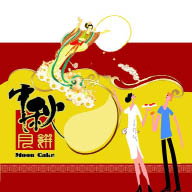New Words
The Mid-Autumn Festival

Conversation
马克: 卡洛琳, 你 知道 今天 是 中秋节 吗?
Mǎkè: Kǎluòlín, nǐ zhīdao jīntiān shì Zhōngqiūjié ma?
Mark: Caroline, did you know that today is the Mid-Autumn Festival?
卡洛琳: 中秋节 是 什么?
Kǎluòlín: Zhōngqiūjié shì shénme?
Caroline: What is the Mid-Autumn Festival?
马克: 中秋节 是 中国 的 传统 节日, 在 每年 的 农历 八月 十五日。 这是 一个 团圆 的 节日。
Mǎkè: Zhōngqiūjié shì Zhōngguó de chuántǒng jiérì, zài měinián de nónglì bāyuè shíwǔ rì. Zhèshì yíge tuányuán de jiérì.
Mark: The Mid-Autumn Festival falls on the 15th day of the eighth lunar month. It’s a traditional holiday and a time for family reunions.
卡洛琳: 这个 节日 有 什么 特别的 食品 吗?
Kǎluòlín: Zhège jiérì yǒu shénme tèbiéde shípǐn ma?
Caroline: Is there a special type of food associated with this festival?
马克: 中秋节 的 传统 食品 是 月饼。
Mǎkè: Zhōngqiūjié de chuántǒng shípǐn shì yuèbing。
Mark: Mooncakes are the traditional fare at the Mid-Autumn Festival.
卡洛琳: 月饼 是 什么 味道 的?
Kǎluòlín: Yuèbing shì shénme wèidao de?
Caroline: What does a mooncake taste like?
马克: 月饼 有 种各样的 馅儿。 有 莲蓉 的, 有栗子的, 还有 很多其他口味的。
Mǎkè: Yuèbing yǒu gèzhǒnggèyàngde xiànr. Yǒu liánróng de, yǒu lìzi de, háiyǒu hěnduō qítā kǒuwèi de.
Mark: Mooncakes have all kinds of fillings, such as lotus seed paste, chestnuts and many other flavors.
卡洛琳: 太 诱人 了。 我 去 买 两块 月饼 尝尝。
Kǎluòlín: Tài yòurén le. Wǒ qù mǎi liǎngkuài yuèbing chángchang.
Caroline: Sounds really mouthwatering. I’m going to buy some mooncakes to try for myself.
1. 中秋节 Zhōngqiūjié The Mid-Autumn Festival
2. 节日 jiérì festival
3. 农历 nónglì lunar calendar
4. 团圆 tuányuán reunion
5. 特别 tèbié special
6. 味道 wèidao flavor
7. 莲蓉 liánróng lotus seed paste
8. 栗子 lìzi chestnut
Grammar
A 的 phrase is one where the structural particle 的 is attached to a notional word or phrase.
For example
有莲蓉的, 有栗子的。
Yǒu liánróng de, yǒu lìzi de.
Some mooncakes are filled with lotus seed paste and some with chestnuts.
Exercises: Make the following words into sentences
For example:
裙子 红 这件 是
qúnzi hóng zhèjiàn shì
skirt red this is
这件裙子是红的。
Zhèjiàn qúnzi shì hóngde.
This skirt is red.
1. 车 那辆 马克 是
chē nàliàng Mǎkè shì
Car that Mark is
2. 毕业 可以 考试合格 学生
bìyè kěyǐ kǎoshìhégé xuéshēng
Graduate may pass the exam students
Chinese Idioms
熟能生巧
Practice Makes Perfect
北宋时期,有个技艺高超的射手。一天, 他练习射箭, 引来了一大群人观看。大家都称赞他的技艺,他也很得意。但是,人群中有个年长的卖油翁只是淡淡地点点头,这使射手很不高兴。他问那卖油翁: “你认为我的技术如何?” 卖油翁回答: “没什么特别的,你只不过是反复练习,所以手法熟练罢了。”射手听后很不服气。于是,卖油翁把一个葫芦放在地上,在葫芦口上放了一枚铜钱, 然后从大油壶里舀起一勺油, 从高处往葫芦里倒。只见油就像线一样从铜钱中间的小孔里滴下去,一滴都没有漏出来。围观者都惊呆了。卖油翁说: “其实这只不过是天天练的结果。”后来, 人们用这个成语来表示一件事熟练了就能做好。
Běisòng shíqī, yǒuge jìyì gāochāode shèshǒu. Yìtiān, tā liànxí shèjiàn, yǐnlái le yí dàqún rén guānkàn. Dàjiā dōu chēngzàn tāde jìyì, tā yě hěn déyì. Dànshì, rénqúnzhōng yǒuge niánzhǎng de màiyóuwēng zhǐshì dàndàn de diǎndiǎntóu, zhèshǐ shèshǒu hěn bù gāoxìng. Tā wèn nà màiyóuwēng: “Nǐ rènwéi wǒde jìshù rúhé?” Màiyóuwēng huídá: “Méishénme tèbié de, nǐ zhǐbúguò shì fǎnfù liànxí, suǒyǐ shǒufǎ shúliàn bàle.” Shèshǒu tīnghòu hěn bù fúqì. Yúshì, màiyóuwēng bǎ yíge húlu fàngzài dìshàng, zài húlu kǒushàng fàngle yìméi tóngqián, ránhòu cóng dàyóuhú lǐ yǎoqǐ yìsháo yóu, cóng gāochù wàng húlu lǐ dào. Zhǐjiàn yóu jiùxiàng xiàn yíyàng cóng tóngqián zhōngjiān de xiǎokǒng lǐ dīxiàqù, yìdī dōu méiyǒu lòu chūlai. Wéiguānzhě dōu jīngdāile. Màiyóuwēng shuō: “Qíshí zhè zhǐbúguò shì tiāntiān liànde jiéguǒ.” Hòulái, rénmen yòng zhège chéngyǔ lái biǎoshì yí jiànshì shúliàn le jiùnéng zuòhǎo.
There lived during the Northern Song Dynasty (960-1127) an accomplished archer. As he was doing his daily practice one day, a big crowd gathered around him, and cheered each time he hit his target. This made him feel pleased with himself, but among the crowd stood an old oil peddler who merely nodded. His pride hurt, the archer asked the old oil peddler, “What do you think of my archery?” The old man answered, “Nothing special. You’ve become skilled through regular practice, that’s all.” The archer was unconvinced. Thereupon, the oil peddler put a gourd bottle on the ground and covered its mouth with a copper cash coin. He then scooped a ladle of oil from his jar, held it high in the air and poured it into the gourd. The crowd watched in amazement as the thread of oil fell from the ladle through the hole at the center of the coin into the gourd. The old man said, “This is nothing special. It’s something I can do because I’ve practiced every day.” Later, people used this idiom to mean practice makes perfect.

